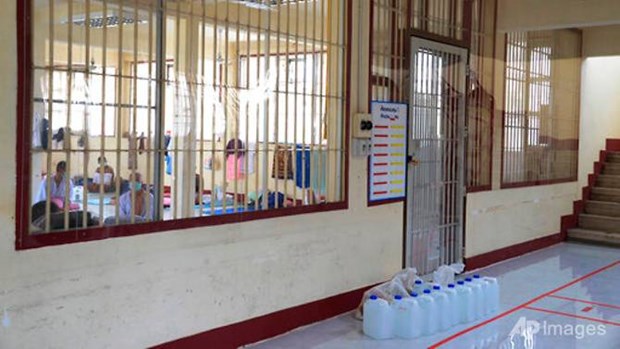COVID-19: Thailand reports record daily cases on May 17
Thailand reported on May 17 a daily record of 9,635 new COVID-19 cases, including over 6,800 infections among prisoners.
 |
| In this photo released by Department of Corrections, prisoners sit inside a field hospital set up at Medical Correctional Institution to treat COVID-19 inmates, in Bangkok, Thailand, on May 8, 2021. (Photo: Department of Corrections, Thailand via AP) |
The combined cases bring the country's total infections to 111,082.
Thailand's COVID-19 task force also recorded 25 new deaths, bringing the total number of fatalities to 614 since the pandemic started last year.
A new field hospital called "Busarakam" has been opened at Impact Muang Thong Thani in Nonthaburi for up to 5,000 COVID-19 patients with moderate symptoms from Bangkok and its surrounding provinces.
Currently, the list of provinces in dark red, or maximum-control, zones has reduced to only four: Bangkok, Nonthaburi, Pathum Thani and Samut Prakan.
As from May 17, restaurants in these four provinces will be permitted to resume dining on premises, until 9pm. But they can only seat 25 percent of their full capacity.
Meanwhile, in 17 provinces in red zones, dine-in services are permitted until 11pm.
In 56 provinces designated in orange zones, restaurants are allowed to operate their usual operating hours but the sale of alcohol is still banned.
Thailand has administered 2.2 million doses of COVID-19 vaccines to front-line workers and high-risk groups so far.
Meanwhile, experts warned that Malaysia could be home to several super spreading, local SARS-CoV-2 variants that are slipping off the health authorities' radar.
According to virologists, while the Health Ministry was focusing on imported variants of concern (VoC), especially the B1617 from India, unidentified local strains could be fuelling the current wave of infections.
Professor Dr Sazaly Abu Bakar, who heads Universiti Malaya's Tropical Infectious Diseases Research and Education Centre, said the presence of superclusters in prisons and detention centres nationwide further proved that the virus had higher ability to endure and proliferate.
There could be one or more local strains based on the increasing number of new cases, rising infectivity and higher transmission rates, as well as growing number of asymptomatic and sporadic cases.
The facility identified two potential local strains recently, he added.
He said Malaysia does not have enough data and research on local samples of the virus in its garrison, stressing that the only way for the country to win is to score a breakthrough in treatment.
Source: VNA